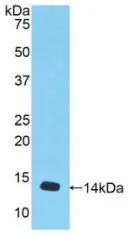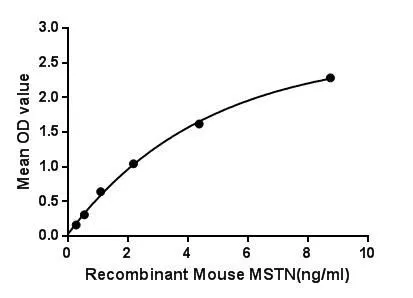
WB analysis of GTX00308-pro Mouse GDF8 / Myostatin protein.
Mouse GDF8 / Myostatin protein, His tag
GTX00308-PRO
ApplicationsFunctional Assay
Product group Proteins / Signaling Molecules
Protein IDO08689
Overview
- SupplierGeneTex
- Product NameMouse GDF8 / Myostatin protein, His tag
- Delivery Days Customer9
- Application Supplier NoteMyostatin (MSTN) also known as growth differentiation factor 8 (GDF-8) a myokine, a protein produced and released by myocytes. It inhibit myogenesis including muscle cell growth and differentiation. Myostatin is a secreted growth differentiation factor that is a member of the TGF beta protein family. Besides, Follistatin Like Protein 3 (FSTL3) has been identified as an interactor of MSTN, thus a binding ELISA assay was conducted to detect the interaction of recombinant mouse MSTN and recombinant mouse FSTL3. Briefly, MSTN were diluted serially in PBS, with 0.01% BSA (pH 7.4). Duplicate samples of 100 microl were then transferred to FSTL3-coated microtiter wells and incubated for 2h at 37C. Wells were washed with PBST and incubated for 1h with anti-MSTN pAb, then aspirated and washed 3 times. After incubation with HRP labelled secondary antibody, wells were aspirated and washed 3 times. With the addition of substrate solution, wells were incubated 15-25 minutes at 37C. Finally, add 50 microl stop solution to the wells and read at 450nm immediately. The binding activity of MSTN and FSTL3 was in a dose dependent manner.
- ApplicationsFunctional Assay
- CertificationResearch Use Only
- ConjugateUnconjugated
- Protein IDO08689
- Protein NameGrowth/differentiation factor 8
- Scientific DescriptionThis gene encodes a secreted ligand of the TGF-beta (transforming growth factor-beta) superfamily of proteins. Ligands of this family bind various TGF-beta receptors leading to recruitment and activation of SMAD family transcription factors that regulate gene expression. The encoded preproprotein is proteolytically processed to generate each subunit of the disulfide-linked homodimer. This protein negatively regulates skeletal muscle cell proliferation and differentiation. Homozygous knockout mice for this gene exhibit increased muscle mass and bone density, and reduced adiposity. [provided by RefSeq, Jul 2016]
- Storage Instruction-20°C or -80°C,2°C to 8°C
- UNSPSC12352202


